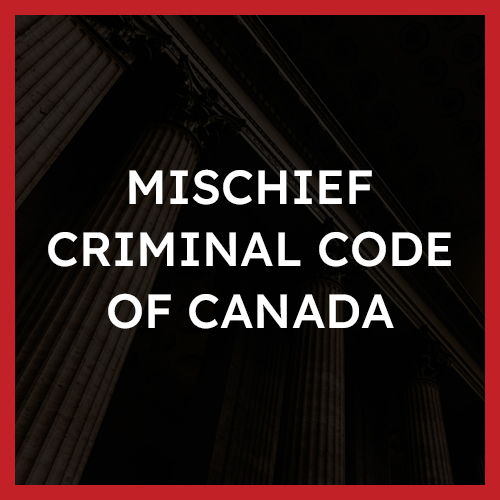Mischief Laws in Canada
What is Mischief in the Criminal Code of Canada?

This section of the Criminal Code describes the offence of mischief in its various forms. Most typically this offence involves property damage such as vandalism. Mischief involves willfully destroying or damaging property, rendering that property useless, dangerous, inoperative or ineffective, or obstructing, interrupting, or interfering with the lawful use, enjoyment or operation of property.
Mischief offences are hybrid offences. This means that depending on the particular circumstances of your case, the Crown can elect to proceed either by indictment or summarily. However, if you are charged under s.420(2) of the Criminal Code, mischief causing danger to life, then this is a straight indictable offence where the Crown cannot elect to proceed otherwise.
Mischief Overview Video
Mischief Examples
Some common examples of mischief include the following:
- Throwing something at your partner’s TV after an argument and damaging it;
- Spray-painting graffiti on the side of a bridge;
- Deleting important files off of a business rival’s computer;
- Smashing someone’s taillight after an incident on the road;
- Hacking into someone else’s computer and changing their passwords;
- Preventing your neighbour from enjoying their evening with excessive noise; or
- Keying your own car with the intent of filing a false insurance claim.
Mischief Defences
A strong defence to a mischief charge will depend entirely on the circumstances of your case.
However, some common defences to a mischief charge may be the following:
- Colour of right;
- Mistake of fact;
- Identity; and
- Any applicable Charter
Mischief Punishments
Upon conviction, the penalty that you may receive for a mischief charge depends on a variety of factors such as whether the Crown proceeded by indictment or summarily, what subsection of mischief you are convicted of and whether there are any aggravating or mitigating factors present in your case.
If the mischief charge is because of property damage, the value of which exceeds $5,000.00:
- Up to 10 years in jail if the Crown proceeds by indictment
If the mischief charge is because of property damage which does not exceed $5,000.00:
- Up to two years in prison if the Crown proceeds by indictment.
However, depending on which subsection of mischief you are charged with different penalties may be applicable.
Overview of the Offence
Under s.430 of the Criminal Code:
Every one commits mischief who wilfully
(a) destroys or damages property;
(b) renders property dangerous, useless, inoperative or ineffective;
(c) obstructs, interrupts or interferes with the lawful use, enjoyment or operation of property; or
(d) obstructs, interrupts or interferes with any person in the lawful use, enjoyment or operation of property.
In relation to computer data, under s. 430(1.1) of the Criminal Code:
Everyone commits mischief who wilfully
(a) destroys or alters computer data;
(b) renders computer data meaningless, useless or ineffective;
(c) obstructs, interrupts or interferes with the lawful use of computer data; or
(d) obstructs, interrupts or interferes with a person in the lawful use of computer data or denies access to computer data to a person who is entitled to access to it.
In order for the Crown to convict you of a mischief offence, they must prove, beyond a reasonable doubt, the actus reus, the mens rea and causation element of the offence of mischief.
The Guilty Act (Actus Reus)
In order for the Crown to secure a conviction under s.430 of the Criminal Code the Crown must prove, beyond a reasonable doubt, the actus reus of the offence which is that you:
- Damaged property;
Property is defined in s.428 of the Criminal Code to mean real or corporal property. It is important to note that it is not a requirement for Crown to prove that the damaged property had a certain monetary value, as the offence applies equally to circumstances where the property is merely rendered dangerous.
Under s.430(1)(d) of the Criminal Code “enjoyment” of property is determined subjectively and refers to the pleasure taken from the use of the property.
The Guilty Mind (Mens Rea)
The mens rea element of the offence that the Crown must prove, beyond a reasonable doubt, is that you:
- Wilfully; or
- Recklessly intended to do the act.
Mischief is a general intent crime and does not require the Crown to prove that you intended to bring about the specific consequences of your actions. Rather, all that is required is that intention on your part that showcases that you intended to perform the action in question. This means that even if you do not mean to damage property specifically if the court finds that you were acting recklessly and that the damage was foreseeable and/or reasonably likely to occur, this will satisfy the requisite mens rea requirement for the offence.
Causation
In addition to proving both the actus reus and mens rea element of the offence, the Crown must also prove causation, beyond a reasonable doubt, to secure a conviction of a mischief offence. This means that the Crown must prove that your actions were directly the cause of the damage in to the property in question.
Mischief Defences
How to Beat a Mischief Charge
A strong defence to a mischief charge will depend on the individual circumstances of your case.
However, some defences to a mischief charge may be:
- Colour of right;
- Mistake of fact;
- Identity; and
- Any applicable Charter
Colour of Right
Under s.429(2) of the Criminal Code, you cannot be convicted of an offence under s. 430 of the Criminal Code if you acted with a colour of right. Colour of right means that you had the legal authority to cause the damage. In terms of mischief, this would most commonly mean that the property was in fact yours, or that you had some other type of legal authority to destroy/damage that property. If you are able to prove you had a colour of right, you cannot be convicted of a mischief charge.
Mistake of Fact
A mistake of fact defence provides that the accused should not be found guilty because they were mistaken regarding a fact that is essential to proving a mischief charge. A mistake of fact defence is designed to limit your criminal liability if you are able to showcase that your conduct arose from an incorrect assumption of fact rather than criminal intent. For example, if you believed that the property that you damaged was in fact yours then you may be able to raise this defence. However, for this defence to work, the court needs to be satisfied that you had a reasonable and genuine belief in the mistake. If you are able to do so, you cannot be convicted of a mischief offence.
Identity
The Crown needs to prove your identity beyond a reasonable doubt. This means that the Crown must prove that it was you who committed the offence. This can often be difficult if there are no witnesses if there were conditions present that prevented a witness from identifying you, or if the offence was captured by poor-quality surveillance footage. Sometimes mistakes do happen, the authorities could have made a mistake in identifying you as the perpetrator based on the poor quality of the footage. Your defence lawyer may be able to argue that the Crown cannot definitively prove that it was you who committed the offence, resulting in an acquittal.
Applicable Charter defences
The Charter sets out your rights and freedoms before and after your arrest. If the police fail to abide by these rights, either deliberately or inadvertently, it could aid in your defence. If you are successfully able to raise a Charter defence, you may be able to have some or all of the evidence that the Crown is relying on to secure a conviction excluded under s.24(2) of the Charter.
Mischief Punishments
The penalties associated with mischief charges will largely depend on the nature of the conduct or the property involved. Additionally, whether the Crown elected to proceed by indictment or summarily, and whether there are any aggravating and mitigating factors present in your case will affect the penalty that you receive for a conviction of mischief.
s.430 (2) – Willful Mischief Endangering Life
If you have been convicted under s.430(2) of the Criminal Code, the Crown could have only proceeded by indictment. This means that upon conviction you may face up to life imprisonment.
You also have available to you a suspended sentence, fine alone, fine and probation, prison, prison and probation, prison and fine, intermittent, and fine, probation, and intermittent. Note that you will not have available to you a discharge or conditional sentence.
s.430 (3) – Willful Mischief, Testamentary Instrument or Property over $5,000.00
If you have been convicted under s.430(3) of the Criminal Code and the Crown proceeded by indictment you can face up to 10 years in jail.
If the Crown proceeded summarily, you could face up to two years less a day in jail and/or a $5,000.00 fine.
You also have available to you a suspended sentence, fine alone, fine and probation, prison, prison and probation, prison, discharge, conditional sentence, and fine, intermittent, and fine, probation, and intermittent sentence.
s.430 (4) – Willful Mischief, Other Property
If you have been convicted under s.430(4) of the Criminal Code and the Crown proceeded by indictment you can face up to two years in jail.
If the Crown proceeded summarily, you could face up to two years less a day in jail and/or a $5,000.00 fine.
You also have available to you a suspended sentence, fine alone, fine and probation, prison, prison and probation, prison, discharge, conditional sentence, and fine, intermittent, and fine, probation, and intermittent sentence.
s.430 (4.1) – Willful Mischief Relating to Religious Property
If you have been convicted under s.430(4.1) of the Criminal Code and the Crown proceeded by indictment you can face up to 10 years in jail.
If the Crown proceeded summarily you could face up to 18 months in jail and/or a $5,000.00 fine.
You also have available to you a suspended sentence, fine alone, fine and probation, prison, prison and probation, prison, discharge, conditional sentence, and fine, intermittent, and fine, probation, and intermittent sentence.
s.430 (4.11) – Willful Mischief Relating to War Memorials
If you have been convicted under s.430(4.11) of the Criminal Code and the Crown proceeded by indictment you can face a maximum of up to 10 years in jail.
However, you will be subject to minimum penalties as follows:
- first offence is a fine of not less than $1,000.00;
- second offence is up to 14 days in jail; and
- for each subsequent offence is up to 30 days in jail.
If the Crown proceeded summarily you could face up to two years less a day in jail and/or a $5,000.00 fine.
You will also have available to you a fine and probation, prison, prison and probation, prison and fine, intermittent, conditional discharge, and fine, probation and intermittent sentence.
s.430 (4.2) – Willful Mischief Relating to Cultural Property
If you have been convicted under s.430(4.2) of the Criminal Code and the Crown proceeded by indictment you can face up to 10 years in jail.
If the Crown proceeded summarily you could face up to two years less a day in jail.
You also have available to you a suspended sentence, fine alone, fine and probation, prison, prison and probation, prison, discharge, conditional sentence, and fine, intermittent, and fine, probation, and intermittent sentence.
s.430 (5) – Willful Mischief, Data
If you have been convicted under s.430(5) of the Criminal Code and the Crown proceeded by indictment you can face a maximum of up to 10 years in jail.
If the Crown proceeded summarily you could face up to two years less a day in jail and/or a $5,000.00 fine.
You also have available to you a suspended sentence, fine alone, fine and probation, prison, prison and probation, prison, discharge, conditional sentence, and fine, intermittent, and fine, probation, and intermittent sentence.
s.430 (5.1) – Willful Act or Omission, Cause Danger to Life or Mischief to Property
If you have been convicted under s.430(5.1) of the Criminal Code and the Crown proceeded by indictment you can face a maximum of up to five years in jail.
If the Crown proceeded summarily you could face up to two years less a day in jail and/or a $5,000.00 fine.
You also have available to you a suspended sentence, fine alone, fine and probation, prison, prison and probation, prison, discharge, conditional sentence, and fine, intermittent, and fine, probation, and intermittent sentence.
Frequently Asked Questions
What is mischief in criminal law?
In Canadian criminal law, mischief is an offence that most commonly relates to vandalism and other types of property damage. Though less common, mischief can also include the deletion of computer data or denying someone enjoyment of their property through some form of harassment/impediment.
Can you go to jail for mischief in Canada?
Yes, you can go to jail for mischief in Canada. The punishment for a mischief conviction is usually proportionate to the severity of the offence itself, meaning the more egregious the mischief is in terms of damage, the greater the punishment will likely be. Thus, depending on how serious the damage is, or the value of the property damaged, you could go to jail for mischief. Other than jail time, you could also receive a criminal record or be charged with a fine.
Can I be charged with mischief if I damage/destroy my own property?
Yes, in some rare circumstances you can be charged if you damage/destroy your own property. Generally, the law wants to let people handle their own property in any way they wish. However, if you are damaging your own property for fraudulent purposes, such as to make a false insurance claim on a car, you can be charged with mischief.
Additionally, if you damage property that is jointly owned with another individual, such as a matrimonial home, you can still be charged with mischief.
Is mischief a serious crime in Canada?
Yes, mischief in Canada is a serious crime. Even for minor mischief charges and first offences you may still receive jail time. Mischief is a hybrid offence which means that the Crown can choose to either proceed by indictment or summarily. If the Crown elects to proceed by indictment, you can face up to 10 years in jail.
Published Decisions
R v Martens, 2018 ABPC 145
In this case, the accused was charged with mischief as well as unlawful entry. In court, the complainant was unable to identify the accused as the man who entered her home, and the defence lawyer successfully raised an ‘identity’ defence. The accused was found not guilty of mischief.
You can read the full decision here.
R v Banks, 2012 NBQB 133
In this case, the accused and the co-accused were inmates in a New Brunswick prison. The inmates were encouraged by a leader to damage property in the prison. The inmates became involved in a riot and caused over $300k in damages to the facility, including the destruction of several toilets, windows, and extensive damage to the sprinkler system. Both inmates were convicted of mischief. The accused received 21 months in prison while the co-accused received 15 months in prison.
You can read the full decision here.
R v J.B., 2005 ABPC 52
In this case, a youth was charged with mischief after he broke into a golf course’s clubhouse in Edmonton. He was extremely intoxicated during the incident and believed that he was entering his own house. The issue, in this case, was to determine whether a belief that is induced in a person because of the voluntary ingestion of alcohol can find the basis for a “color of right” argument. The judge found that because the accused became intoxicated voluntarily, he could not rely on that intoxication in order to then rely on the colour of right defence. The accused was found guilty of mischief.
You can read the full decision here.
About The Author
Ask A Question
We endeavor to respond to questions within 24 hours. If your matter is urgent, please call our office or submit a request for a free consultation.







